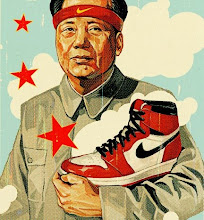One of the most difficult things to keep up with during my diet is eating healthy. Back in college, although John Jay dining hall and all the other Columbia University places for food wasn't overwhelmingly great, they still provided a lot of options for low-calorie diets. I could go in, pick up some grilled chicken at the salad bar with some egg whites. In restaurants, there were always options for meals that were more healthy - low in cholesterol, low fat/oil and low calories.
Food in China is much harder to deal with. Unless I cook the meal myself, I really don't have too much confidence in the contents of food... healthy-eating wise. Don't get me wrong, Chinese food is clean, really delicious and cheap, but on the oil usage side, it leaves something to be desired.
With the price of food skyrocketing in recent months, its only logical that small restaurants would want to conserve costs in every way possible. This presents even more problems with a healthy-eating lifestyle.
Here are some of the issues I've been experiencing.
- Often times dishes are covered in oil and are high in salt content. Salty foods makes you want to eat more rice = hidden calories
- Lots of dishes are smothered in thick, rich sauces. While these sauces taste awesome, they are another source of hidden calories.
- The price of pork has increased by more than 50%. This means restaurants use more fatty pork in their dishes than they would traditionally to reduce cost.
- Restaurants sometimes use old cooking oil that has been used in friers. As with the same problem in McDonald's fries, repeated use of the same oil is unhealthy.
- Eating at Chinese restaurants can be problematic with regard to portion. After having a little bit of a lot of different dishes in a potluck/communal way, its really difficult to measure how much you are eating.
- Only relatively healthy American establishment is Subway. Since I live more than 5 miles away, it's not a viable option.
Here are the main foods that I rely on available at the local supermarkets:
- Boneless chicken breast is available everywhere. Although Chinese people generally love pork, for some reason, stores sell chicken breast too. For about 6RMB, I can get a healthy portion that I cook on the George Foreman grill after marinating it in soy sauce.
- Canned tuna is widely available as well, but a little expensive compared to the US. Individual cans go for about 11-14RMB at the foreign foods aisle.
- Salads are big for me. Since veggies are relatively cheap, its a good way to eat healthy. The only thing is dressing selection is limited. This means, I buy dressing every time I'm back in the USA.
- The availability of cheap sandwich meats have been a recent phenomenon. Pastrami, ham and beef ham cost about 7RMB for 10 circular slices. Place that in some mutigrain bread with some mustard and it kind of feels like the US.
- For drinks, I stick with Dole OJ (16RMB fora typical jug), water and the recent introduction of Coke Zero to the Chinese market.

